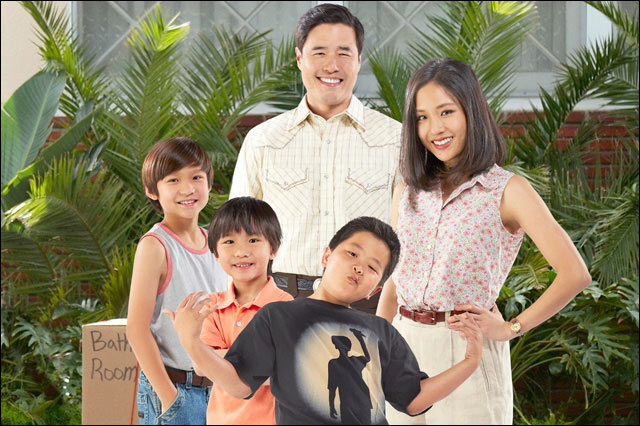Welcome back to "Fresh Off the Boat." On this, the second week of the historic Asian-American family sitcom, I could feel the euphoria dissipating. Don’t get me wrong. I’m still reeling with delight from the Asian faces and firsts I’m seeing on my TV, but it was somewhere midway through Episode 3 last night that I was reminded: I’m watching a family sitcom on a major television network. There’s bound to be some stank.
The show is giving viewers a glimpse of how it will handle blackness and Eddie’s abiding love of hip-hop. The short answer? Not so well.
Eddie, who continues to struggle to fit in in his new Orlando school, devises a plan to get in with the white kids at school after he’s ridiculed for wearing "nurse shoes" and not Air Jordans, the ’90s shoe du jour. He protests: "Walter," a black boy and apparently the only other kid of color, "isn’t wearing Jordans either!"
"He doesn’t need to. He’s black," a white boy responds, "That’s like built-in Jordans."
Eddie’s eventual plan is ODB-inspired. "Shimmy Shimmy Ya" teaches him that, "a hot girl was the ultimate status symbol," the real Eddie Huang says in a voiceover. In an awkward fantasy sequence, the young Eddie, played by Hudson Yang, squirts a Capri Sun over the body of Honey, the family’s hot blonde neighbor who Eddie’s convinced can bring him out of social purgatory. It’s a distinctly weird thing to watch.
The real Huang "considered the thrust of the episode outright offensive," Wesley Yang wrote for the New York Times Sunday Magazine. For Huang, the bit "denigrates hip-hop culture by portraying it as a vector for adopting sexist attitudes — a perversion of what, for him, had been a vital emotional outlet."
The show has made sure to imbue young Eddie’s mannerisms, dress and outlook, with a hip-hop aesthetic. But it’s never quite clear that hip-hop is more than a youthful fascination for the fictional Eddie. The real Eddie, meanwhile, has credited hip-hop as his lifeline in a childhood defined by abuse at home and bullying at school, and cultural dislocation all around. In the show though, his love of hip-hop is often the setup for a joke, or the punchline itself. (What’s a chubby Asian kid doing rocking chains and an Orlando Magic jersey? the show asks.) Huang has been vocal about pointing out the distance between the show and its source material, his own memoir by the show’s same name. That hasn’t made the show’s flat depictions of blackness and hip-hop much easier to forgive.
In another scene, Huang’s grandmothers, obsessed with the round-the-clock coverage of the OJ Simpson trial, mistake a black repo man for Simpson himself. It’s a moment of uninformed Asian attitudes toward blackness that felt both true, and off, to me. Some members of my own family still refer to black people as "hak gwai," as in "black ghosts." (Among my relatives, whites are only occasionally called "bak gwai," or "white ghosts." My family usually calls them the more neutral "bak yun," or "white people.") Far be it for my own family to be the sole barometer by which a fictional show’s relationship to reality is measured, but trust me: anti-blackness is a thing among Asians. But on TV, the moment hangs there as if the audience is supposed to laugh at the grandmas’ OJ mirage. It’s an odd, uncritical depiction of racial ignorance. And perhaps worse, not even funny.
In the end, Eddie does get what he’s going for–a hug with Honey within his classmates’ direct view. But not before his mom, Jessica, played with a silly ferocity and crazy Asian-mom intensity by Constance Wu, makes her first true friend in Honey. Four episodes in, it’s apparent that Wu is the show’s breakout star and that Jessica is also the show’s most interesting character. She’s hard-driving and unyielding, competitive and ridiculous, and also easily wounded when her mother’s affections swing to her sister.
One of the best parts of the show is that it doesn’t take an outsiders-looking-in approach. The show, based on one family’s experience in suburban Orlando, instead aims its lens at the absurdities of American culture, and by extension, whiteness. What is NASCAR? What is so great about rollerblading? What are block parties? Why do white people put cheese on everything? That’s where the show does some of its best work. I’m tuning in for those moments now. And for more of Jessica Huang’s karaoke.
